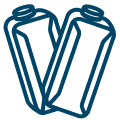Signs of Crohn's Disease and 7 Nutritional Tips


What is Crohn’s disease?
Crohn’s disease is an autoimmune condition and form of inflammatory bowel disease (IBD) that causes chronic inflammation of the gastrointestinal (GI) tract, otherwise known as your digestive system. The inflammation caused by Crohn’s can affect various parts of the GI tract but is most commonly concentrated in the small intestine and beginning of the large intestine. The exact cause of Crohn’s disease is not fully understood but is suspected to be the intersection of genetic, immune, and environmental factors like diet, imbalances in the gut microbiome, family history, and prior infections — to name a few. While Crohn’s can affect anyone at any stage of life, background, or gender, it’s diagnosed the most in:
Young people between ages 15 and 39 (20% of IBD patients will have symptoms before age 15)
People of White European descent, specifically Eastern European Ashkenazi Jewish descent (Ashkenazi Jewish People are more likely to develop IBD)
People who have a history of smoking, eating a high-fat, ultra processed diet, and using non-steroidal anti-inflammatory drugs (NSAIDs) or birth control pills
What are the signs and symptoms of Crohn’s disease? Because symptoms of Crohn’s can vary quite drastically in their severity and frequency, it can take anywhere from several months to a few years to get a formal diagnosis.
For some, they’ll experience a gradual buildup of symptoms, while others will undergo a sudden onset without any warning. Like always, if you're experiencing any of the symptoms below, we urge you to make an appointment with a healthcare professional. The most common symptoms of Crohn’s include:
Abdominal pain and cramping, often in the lower right-hand side
Chronic diarrhea
Loss of appetite and weight loss
Bloody stools
Fever and fatigue that doesn’t improve with rest
Mouth ulcers, or pain in and around your mouth and gums
Swollen and painful joints
Skin bumps, rashes, and/or sores
Note: If you’ve experienced a persistent change in your bowel habits or any of the symptoms listed above for more than 14 days, please consult with your doctor as soon as possible.
1. Know your triggers.
Everyone with Crohn’s is going to have a slightly different experience, so it’s important to know which specific foods irritate your system.
A tool to help you with this may be keeping a food and symptom diary to discuss with your doctor at your next visit.
In general, alcohol, caffeine, carbonated drinks, sugar alcohols like mannitol and xylitol, and salty, fatty, sweetened, or spicy foods may be triggers. However, this doesn’t mean they’ll automatically upset your system.
2. Increase your protein intake.
Protein needs actually increase while you’re fighting off illness since your body is trying to heal and repair. Increasing your protein intake might sound difficult at first, but it's less overwhelming when you realize there are dozens of plant-based foods that can help. Some good sources of protein include beans, legumes, peas, and seeds; even broccoli, spinach, kale, oats, barley and other whole grains have some protein. Work with your healthcare professional to develop a plan that includes foods you already love!
3. Prepare your food for ease of digestion.
Blending, baking, or stewing fruits and vegetables, drinking enough fluids, and eating mindfully can help ensure you’re thoroughly chewing and eating smaller, more frequent meals to get the nutrients you need while reducing overall digestive burden. Ways to make smaller meals that are more nutrient-dense include:
Adding in snacks like a banana with seed butter or yogurt and berries
Adding olive oil, seed butters, tahini, or small amounts of avocado to meals
Having a smoothie or shake in between meals
4. Consult your healthcare team when following specialized diets.
It’s normal for people with chronic conditions, especially GI related, to struggle with challenges around eating. Talk to your doctor and, or dietitian about complementary diets for your specific condition.
Working closely with your healthcare team and dietitian helps ensure you’re still able to meet your nutritional needs while following a therapeutic diet.


5. Exercise caution around foods associated with inflammation.
While these foods are known to contribute to inflammation when consumed consistently over time, this isn’t to suggest they should be avoided entirely.
Food additives found in some ultra processed foods like: carboxymethylcellulose, polysorbate-80, carrageenan, maltodextrin, artificial coloring, artificial flavoring, natural flavoring, titanium dioxide, sulfates, guar gum, nitrates and nitrites
Artificial sweeteners with maltodextrin
If they’re part of some of your favorite indulgences, they’re okay in moderation.
6. Opt for anti-inflammatory foods when possible.
When regularly incorporated, a Mediterranean diet, otherwise known as an anti-inflammatory diet, has been shown to aid in Crohn’s recovery and management.
Foods rich in omega-3 fatty acids: fatty fish (salmon, tuna, mackerel, etc.), walnut butter, chia seeds, flaxseed oil, flaxseed meal.
An abundance of plant foods like fruits, vegetables, whole grains, beans, legumes, and potatoes.
Olive oil as a primary fat source.
7. Consider using nutritional supplements.
Liquid nutrition, especially when dealing with flares, can be an incredibly helpful way to help you get in the essential vitamins and minerals, fat, protein, and fiber you need to feel your best without overstressing your system.
Some studies have even suggested inflammatory bowel disease patients who incorporate liquid enteral nutrition into their diets with balanced ratios of protein, fat, fiber, and other vital nutrients have lower rates of relapse — when coupled with other aspects of a balanced, plant-rich diet.
The content on this site (the “Content”) is provided for information purposes only. Kate Farms has attempted to include information it believes to be reliable and accurate as of the date of this Content. Kate Farms expressly disclaims and makes no representation or warranty of any kind, express or implied, as to the Content including the accuracy or completeness of the information in this Content. Kate Farms shall have no liability relating to or resulting from the use of this Content. The Content is not intended as a replacement for medical advice, approved practices or policies of a particular physician and/or healthcare facility standards of care, all of which you should consider when using this Content.
Getting Kate Farms by Prescription
You or your loved one may be eligible to receive insurance coverage for Kate Farms products. You must have a prescription from their doctor. Here are some tips on how to get that process started.
Learn More
Talk to your doctor to get a prescription.

Find out what formula is right for you.
Send your prescription to a supplier.

Product is shipped to you.
Explore Our Pediatric Peptide Products
References:
Campmans-Kuijpers MJE, Dijkstra G. Food and food groups in inflammatory bowel disease (IBD): the design of the Groningen anti-inflammatory diet (GrAID). Nutrients. 2021;13(4):1067. doi:10.3390/nu13041067
Cushing K, Higgins PDR. Management of Crohn disease: a review. JAMA. 2021;325(1):69-80. doi:10.1001/jama.2020.18936
Di Giorgio FM, Melatti P, et al. A narrative review on eating disorders and disordered eating in inflammatory bowel diseases: need for increased awareness. Dietetics. 2023;2(2):150-160. doi:doi.org/10.3390/dietetics2020012
Ha F, Khalil H. Crohn’s disease: a clinical update. Therap Adv Gastroenterol. 2015;8(6):352-359. doi:10.1177/1756283X15592585
Hashash JG, Binton DG, et al. AGA Clinical Practice Update on diet and nutritional therapies in patients with inflammatory bowel disease: expert review. Gastroenterology. 2024;166(3):521-532. doi:10.1053/j.gastro.2023.11.303
Hendrickson BA, Gokhale R, et al. Clinical aspects and pathophysiology of inflammatory bowel disease. Clin Microbiol Rev. 2002;15(1):79-94. doi:10.1128/CMR.15.1.79-94.2002
The IBD diet: nutrition for active inflammatory bowel disease. UC Health. April 2, 2024. Accessed August 26, 2024. https://www.uchealth.com/en/media-room/articles/ibd-diet-guide
Kenny EE, Pe’er I, et al. A genome-wide scan of Ashkenazi Jewish Crohn’s disease suggests novel susceptibility loci. PLoS Genet. 2012;8(3):e1002559. doi:10.1371/journal.pgen.1002559
Kostovcikova K, Coufal S, et al. Diet rich in animal protein promotes pro-inflammatory macrophage response and exacerbates colitis in mice. Front Immunol. 2019;10:919. doi:10.3389/fimmu.2019.00919
Levine A, Rhodes JM, et al. Dietary guidance from the International Organization for the Study of Inflammatory Bowel Diseases. Clin Gastroenterol Hepatol. 2020;18(6):1381-1392. doi:10.1016/j.cgh.2020.01.046
Nutrition and Crohn’s disease. UVA Health. Updated March 2024. Accessed August 26, 2024. https://www.healthsystem.virginia.edu/docs/per/nutrition-and-crohns-disease/handout_view_patient/@@getDocument
Reddavide R, Rotolo O, et al. The role of diet in the prevention and treatment of inflammatory bowel diseases. Acta Biomed. 2018;89(Suppl 9):60-75. doi:10.23750/abm.v89i9-S.7952
Torres J, Mehandru S, et al. Crohn’s disease. Lancet. 2017;389(10080):1741-1755. doi:10.1016/S0140-6736(16)31711-1
Veauthier B, Hornecker JR. Crohn’s disease: diagnosis and management. Am Fam Physician. 2018;98(11):661-669.
What is the Mediterranean diet? American Heart Association. Last reviewed May 15, 2024. Accessed August 26, 2024. https://www.heart.org/en/healthy-living/healthy-eating/eat-smart/nutrition-basics/mediterranean-diet
What should I eat? Crohn’s & Colitis Foundation. Accessed August 26, 2024. https://www.crohnscolitisfoundation.org/patientsandcaregivers/diet-and-nutrition/what-should-i-eat
Więcek M, Panufnik P, et al. Diet as therapeutic intervention in Crohn’s disease. Prz Gastroenterol. 2022;17(2):96-102. doi:10.5114/pg.2022.116376








